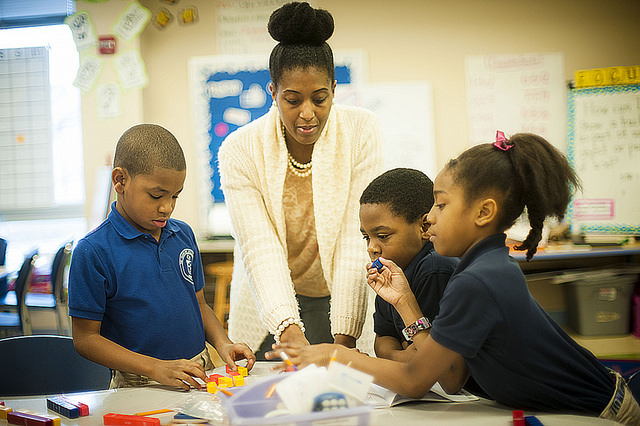Mindsets Matter
 By Catherine Good, Ph.D., Senior Research Scientist
By Catherine Good, Ph.D., Senior Research Scientist
Summer is a great time to reflect on the past school year and think about changes for the new year. In past posts, we delved into the concept of growth mindset and explored effective strategies to promote students’ persistence and foster healthy mindsets about learning. Student mindsets have been the central focus of these posts, but teacher mindsets are just as important! Your own perspective on the potential for growth can subtly (and not so subtly) affect the way you structure your classroom, give feedback to students, make pedagogical choices and form judgements about students’ capacities and character.
What is Your Mindset?
Before we begin, take a moment to reflect on your own mindset. Do you have a more fixed or growth mindset? How can you tell? Well, it turns out that we all have a mix of both fixed and growth mindset beliefs. And as Carol Dweck, Lewis and Virginia Eaton Professor of Psychology at Stanford University, recommends, we should get in touch with “our fixed mindset triggers.” To discover your triggers, ask yourself the following:
- When you face a challenge, do you feel anxious or energized?
- Does your inner voice warn you to retreat or encourage you to press on?
Now think about your classroom. When you face a teaching challenge or feel your students aren’t engaged and learning, do you look for an external excuse or do you examine your own practices and identify areas for improvement? Start paying attention to the situations that trigger your fixed mindset reactions. Being aware of your reactions is the first step towards working through them so that you can avoid many fixed mindset pitfalls.
Mindsets in the Classroom
When students hold a fixed mindset, they are often more concerned with proving their abilities than improving them. The same is true for teachers. When teachers hold a fixed mindset, they are more focused on rewarding students for their superior performance rather than their growth over time. Fixed mindset teachers give special privileges to students who do the best work, often prominently displaying their work as examples to others. They are also likely to encourage students to compete with each other and emphasize students’ standing in the class in relation to others. While some of these approaches may seem like a good way to motivate students, they can also teach students to develop a focus on performance rather than learning, which is at the root of a fixed mindset.
On the other hand, growth mindset teachers are more likely to value progress over performance. They explicitly recognize students’ individual progress, even if they are below grade level, and when it comes time to assign that final grade on the report card, they take into account progress and improvement over time.
Responding to Struggling Students
Imagine a student who is struggling in your class, perhaps having earned a failing grade on the most recent test or assignment. How do you respond to this student? Your mindset plays a big role in how you might answer this question. When faced with a student’s recent failure, fixed mindset teachers are more likely to give the student easier tasks, hold her to lower standards and orient her to successes in other areas of life. These responses may be born out of a concern for providing comfort to a student and boosting self-esteem, but these “kind” strategies (such as assigning less work) are unlikely to promote more engagement with the subject. Alternatively, growth mindset teachers are more likely to stress processes and strategies that are likely to lead to success in the future (like encouraging the student to seek extra help outside of class), continue to hold her to high standards and assign more (not less) work. Interestingly, when a student receives these two different patterns of responses from the teachers, the child is able to accurately perceive the teacher’s underlying mindset. What’s more, the student’s expectation for success in the class, motivation and investment in the class are also affected by these subtle teaching differences.
Attributions for Behavior
As a teacher, your mindset affects more than just your perception of students’ abilities and potential; it can also affect your judgments of your students’ character and personality. Think about a typical day at school. Do certain students consistently disrupt class or appear apathetic to the lessons you are teaching? What are the reasons, or attributions, that you make for these students’ behaviors? With a fixed mindset, you are likely to think that the student is behaving this way because of his or her underlying personality traits. Disinterested students act disinterested, teachers sometimes think, because they lack a curious character. Having a fixed mindset about your students can lead to missed opportunities to find connections with them, to understand the forces that might be driving their behavior and to provide appropriate supports to help them grow and develop.
Imagine instead of attributing poor behavior to a fault in character, considering the external reasons why your students behave the way they do – perhaps students appear disinterested because they lack the background knowledge to fully engage with the content? Perhaps they fought with a family member on the way to school and are distracted? Or maybe the students did not get a good night’s sleep or eat breakfast? By embracing a growth mindset and focusing more on the situation, rather than underlying character, you are more likely to find ways to help students abandon their negative behaviors and embrace more productive ones.
As you create your classroom norms and consider the pedagogical practices you want to promote this coming school year, keep in mind that your mindset matters. It can shape the culture you establish, the ways you respond to students and the judgments you make about them. How have you seen your own mindset effect your classroom? Tweet at @Turnaround #The180.

Share This Story